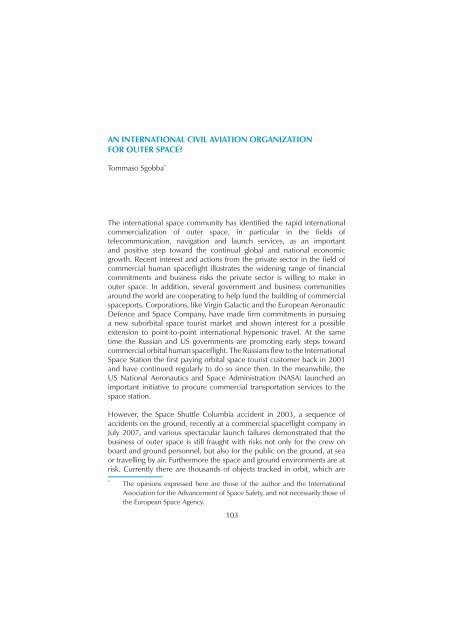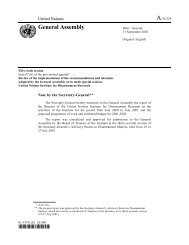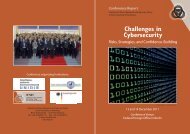Security in Space The Next Generation - UNIDIR
Security in Space The Next Generation - UNIDIR
Security in Space The Next Generation - UNIDIR
You also want an ePaper? Increase the reach of your titles
YUMPU automatically turns print PDFs into web optimized ePapers that Google loves.
AN INTERNATIONAL CIVIL AVIATION ORGANIZATION<br />
FOR OUTER SPACE?<br />
Tommaso Sgobba *<br />
<strong>The</strong> <strong>in</strong>ternational space community has identifi ed the rapid <strong>in</strong>ternational<br />
commercialization of outer space, <strong>in</strong> particular <strong>in</strong> the fi elds of<br />
telecommunication, navigation and launch services, as an important<br />
and positive step toward the cont<strong>in</strong>ual global and national economic<br />
growth. Recent <strong>in</strong>terest and actions from the private sector <strong>in</strong> the fi eld of<br />
commercial human spacefl ight illustrates the widen<strong>in</strong>g range of fi nancial<br />
commitments and bus<strong>in</strong>ess risks the private sector is will<strong>in</strong>g to make <strong>in</strong><br />
outer space. In addition, several government and bus<strong>in</strong>ess communities<br />
around the world are cooperat<strong>in</strong>g to help fund the build<strong>in</strong>g of commercial<br />
spaceports. Corporations, like Virg<strong>in</strong> Galactic and the European Aeronautic<br />
Defence and <strong>Space</strong> Company, have made fi rm commitments <strong>in</strong> pursu<strong>in</strong>g<br />
a new suborbital space tourist market and shown <strong>in</strong>terest for a possible<br />
extension to po<strong>in</strong>t-to-po<strong>in</strong>t <strong>in</strong>ternational hypersonic travel. At the same<br />
time the Russian and US governments are promot<strong>in</strong>g early steps toward<br />
commercial orbital human spacefl ight. <strong>The</strong> Russians fl ew to the International<br />
<strong>Space</strong> Station the fi rst pay<strong>in</strong>g orbital space tourist customer back <strong>in</strong> 2001<br />
and have cont<strong>in</strong>ued regularly to do so s<strong>in</strong>ce then. In the meanwhile, the<br />
US National Aeronautics and <strong>Space</strong> Adm<strong>in</strong>istration (NASA) launched an<br />
important <strong>in</strong>itiative to procure commercial transportation services to the<br />
space station.<br />
However, the <strong>Space</strong> Shuttle Columbia accident <strong>in</strong> 2003, a sequence of<br />
accidents on the ground, recently at a commercial spacefl ight company <strong>in</strong><br />
July 2007, and various spectacular launch failures demonstrated that the<br />
bus<strong>in</strong>ess of outer space is still fraught with risks not only for the crew on<br />
board and ground personnel, but also for the public on the ground, at sea<br />
or travell<strong>in</strong>g by air. Furthermore the space and ground environments are at<br />
risk. Currently there are thousands of objects tracked <strong>in</strong> orbit, which are<br />
* <strong>The</strong> op<strong>in</strong>ions expressed here are those of the author and the International<br />
Association for the Advancement of <strong>Space</strong> Safety, and not necessarily those of<br />
the European <strong>Space</strong> Agency.<br />
103








